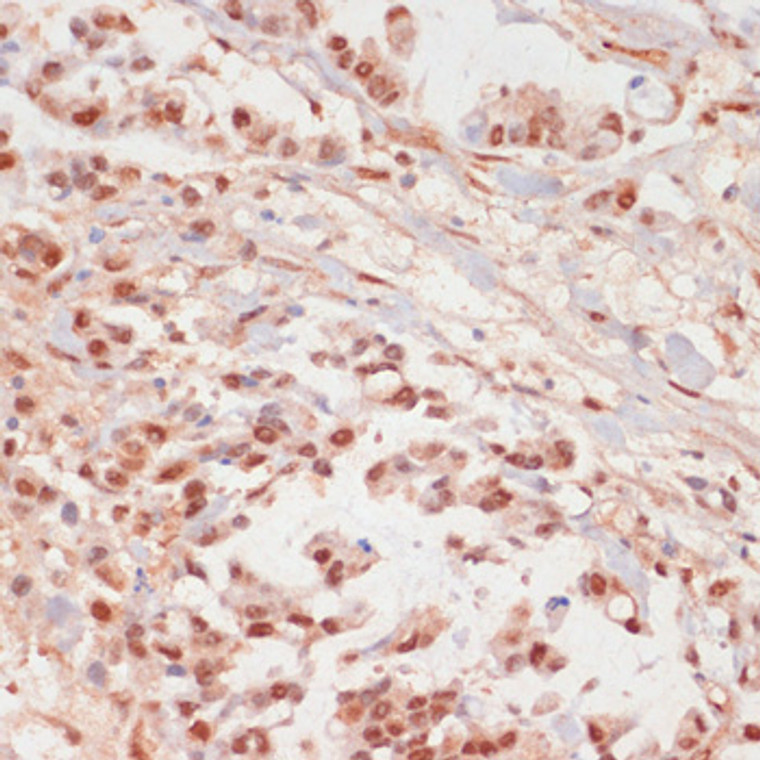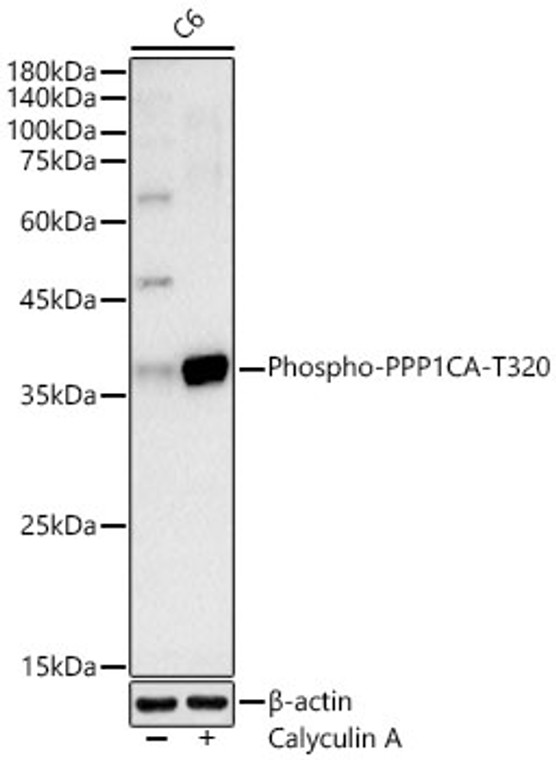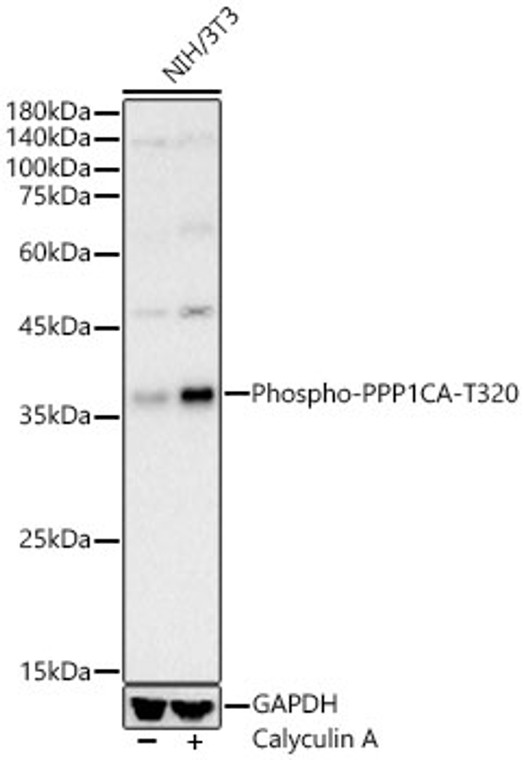| Host: |
Rabbit |
| Applications: |
WB/IHC |
| Reactivity: |
Human/Mouse/Rat |
| Note: |
STRICTLY FOR FURTHER SCIENTIFIC RESEARCH USE ONLY (RUO). MUST NOT TO BE USED IN DIAGNOSTIC OR THERAPEUTIC APPLICATIONS. |
| Short Description: |
Rabbit polyclonal antibody anti-Phospho-PPP1CA-T320 is suitable for use in Western Blot and Immunohistochemistry research applications. |
| Clonality: |
Polyclonal |
| Conjugation: |
Unconjugated |
| Isotype: |
IgG |
| Formulation: |
PBS with 0.01% Thimerosal, 50% Glycerol, pH7.3. |
| Purification: |
Affinity purification |
| Dilution Range: |
WB 1:500-1:2000IHC-P 1:50-1:100 |
| Storage Instruction: |
Store at-20°C for up to 1 year from the date of receipt, and avoid repeat freeze-thaw cycles. |
| Gene Symbol: |
PPP1CA |
| Gene ID: |
5499 |
| Uniprot ID: |
PP1A_HUMAN |
| Immunogen: |
A synthetic phosphorylated peptide around T320 of human PPP1CA (NP_002699.1). |
| Immunogen Sequence: |
PITPP |
| Post Translational Modifications | Phosphorylated. Dephosphorylated at Thr-320 in the presence of ionizing radiation. |
| Function | Protein phosphatase that associates with over 200 regulatory proteins to form highly specific holoenzymes which dephosphorylate hundreds of biological targets. Protein phosphatase 1 (PP1) is essential for cell division, and participates in the regulation of glycogen metabolism, muscle contractility and protein synthesis. Involved in regulation of ionic conductances and long-term synaptic plasticity. May play an important role in dephosphorylating substrates such as the postsynaptic density-associated Ca(2+)/calmodulin dependent protein kinase II. Component of the PTW/PP1 phosphatase complex, which plays a role in the control of chromatin structure and cell cycle progression during the transition from mitosis into interphase. Regulates NEK2 function in terms of kinase activity and centrosome number and splitting, both in the presence and absence of radiation-induced DNA damage. Regulator of neural tube and optic fissure closure, and enteric neural crest cell (ENCCs) migration during development. In balance with CSNK1D and CSNK1E, determines the circadian period length, through the regulation of the speed and rhythmicity of PER1 and PER2 phosphorylation. May dephosphorylate CSNK1D and CSNK1E. Dephosphorylates the 'Ser-418' residue of FOXP3 in regulatory T-cells (Treg) from patients with rheumatoid arthritis, thereby inactivating FOXP3 and rendering Treg cells functionally defective. Dephosphorylates CENPA. Dephosphorylates the 'Ser-139' residue of ATG16L1 causing dissociation of ATG12-ATG5-ATG16L1 complex, thereby inhibiting autophagy. (Microbial infection) Necessary for alphaviruses replication. |
| Protein Name | Serine/Threonine-Protein Phosphatase Pp1-Alpha Catalytic SubunitPp-1a |
| Database Links | Reactome: R-HSA-163560Reactome: R-HSA-180024Reactome: R-HSA-2173788Reactome: R-HSA-400253 |
| Cellular Localisation | CytoplasmNucleusNucleoplasmNucleolusPrimarily Nuclear And Largely Excluded From The NucleolusHighly Mobile In Cells And Can Be Relocalized Through Interaction With Targeting SubunitsNom1 Plays A Role In Targeting This Protein To The NucleolusIn The Presence Of Ppp1r8 Relocalizes From The Nucleus To Nuclear SpecklesShuttles Toward The Cytosol During Infection With Veev |
| Alternative Antibody Names | Anti-Serine/Threonine-Protein Phosphatase Pp1-Alpha Catalytic Subunit antibodyAnti-Pp-1a antibodyAnti-PPP1CA antibodyAnti-PPP1A antibody |
Information sourced from Uniprot.org
12 months for antibodies. 6 months for ELISA Kits. Please see website T&Cs for further guidance













